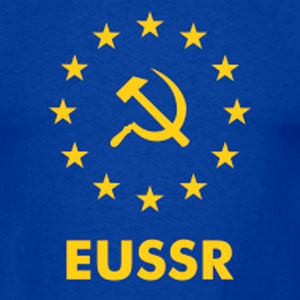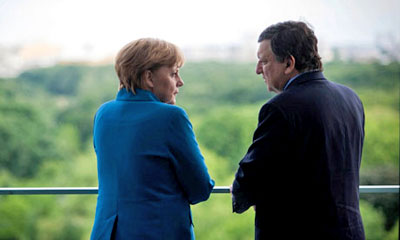
by Brit Dee
04 June 2012
from
ResistRadio Website
The European elite are predictably planning to
exploit the ongoing collapse of the Euro to further centralize power.
With Greece and other countries on the brink, some may have thought the
European dream to be crumbling - and even dared hope for greater national
sovereignty and the kicking out of corrupt financial institutions and their
fraudulent debts.
Unfortunately such dreams will quickly turn nightmarish if the plans are
successful.
The
EU elite are currently preparing to pool
vast national debt and banking liabilities... in return for Eurozone
governments surrendering sovereignty over their budgets and fiscal policies
to a central Eurozone authority.
Such plans represent an ambitious attempt to socialize national debts and
further consolidate EU power and have been drawn up by the European council
president, the commission chief, the president of the European Central Bank
and the head of the Eurogroup of 17 finance ministers. They will be
presented to an EU summit at the end of the month.
As the most powerful economy in Europe, Germany would control the
purse-strings of such a European-wide banking union - leading billionaire
elite leftist
George Soros
to describe:
a Eurozone dominated by Germany...
permanently depressed areas in need of constant transfer of payments… it
would be a German empire with the periphery as the hinterland.
Welcome to the EUSSR!

Germany Weighs Up Federal Europe Plan to...
End Debt Crisis
by Ian Traynor in Brussels and
Giles Tremlett in Madrid
5 June 2012
from
TheGuardian Website
|
Calls for 'banking union' to save euro
after Paris and Brussels support Spain's plea for EU rescue of its
beleaguered banks |

Angela Merkel speaks with
European Commission President
José Manuel Barroso
at their meeting in Berlin.
Photograph: BPA/Reuters
Europe's leaders appear to be edging towards an
ambitious and controversial new blueprint for a federalized Eurozone after
Paris and Brussels threw their weight behind Spain's pleas for an EU rescue
of its beleaguered banks.
At the start of three weeks likely to be crucial to the survival of the
euro, the new French government and the European commission voiced strong
backing for a new Eurozone "banking union" to save the single currency.
The plan could see vast national debt and banking liabilities pooled - and
then backed by the financial strength of Germany - in return for Eurozone
governments surrendering sovereignty over their budgets and fiscal policies
to a central Eurozone authority.
Spain's banking crisis, together with extreme volatility in Greece ahead of
the rerun general election on 17 June and the French parliamentary poll on
the same day, are compounding the febrile atmosphere and worrying the
markets.
A "gang of four",
-
the European council president
-
the commission chief
-
the president of the European Central
Bank
-
the head of the eurogroup of 17 finance
ministers,
...has been charged with drafting the proposals
for a deeper Eurozone fiscal union, to be presented to an EU summit at the
end of the month.
"You can't demand eurobonds but not be
prepared for the next step in European integration," Germany's
chancellor, Angela Merkel,
said at the weekend.
"We won't be able to create a successful
currency like that and no one outside will lend us money any more."
Pierre Moscovici, the new French finance
minister, said Eurozone bailout funds should be used to inject cash into
collapsing banks.
Such direct payments are impossible under
existing rules. Moscovici added that France wants the summit to set up a
Eurozone banking union, which would take on responsibility for propping up
failing banks and guarantee depositors' savings across the 17 countries.
The commission and France are piling pressure on Germany to line up behind
the proposal, which Merkel would need to take to her parliament for
agreement. Renewed focus on Merkel came as she endured some of the strongest
criticism yet seen during the 30-month crisis for the way she has handled
the euro turbulence.
Joschka Fischer, the former German foreign minister, warned that his
country was at risk of destroying itself and Europe for the third time in a
century, and gave Merkel just a few months to change course and save the
currency.
In an article published on Monday, he wrote:
"Germany destroyed itself - and the European
order - twice in the 20th century. It would be both tragic
and ironic if a restored Germany, by peaceful means and with the best of
intentions, brought about the ruin of the European order a third time."
At a meeting in Berlin on Monday night, José
Manuel Barroso, the European commission president, was expected to press
Merkel on the issue of bank rescues, which has turned critical because of
Spain's banking emergency.
Spain's prime minister, Mariano Rajoy, is reluctant to request a
full-scale EU bailout because it would come with draconian and humiliating
terms.
He has the support of Olli Rehn, the European
commissioner for monetary affairs.
"It is important to consider this
alternative of direct bank recapitalization," said Rehn, "to break the
link between the sovereigns and the banks."
Under existing rules for the bailout fund, money
may go only to governments that can request a state rescue and then use the
cash to shore up their distressed banks.
The vast bulk of the Irish bailout has gone
directly to the country's ailing banks.
On his debut visit to Brussels, Moscovici called for a change in those
rules:
"We are in favour of this banking union," he
said. "It's a fundamental issue for which proposals are on the table."
Spain's most senior banker, Emilio Botin,
boss of Santander, called on Europe's rescue funds to help out.
He said four of Spain's banks needed €40bn
(£32bn) of new capital "and that will be enough". Botin's figures reportedly
include €19bn that the Spanish government has already pledged to pump into
stricken lender Bankia - cash that Spain does not have.
Botin's assessment is at odds with banking analysts, who estimate that
Spain's banks need up to €100bn. Santander, which operates a ringfenced
banking business in the UK, is not among those judged to need fresh capital.
However, it is likely that if new direct bank
support were approved for Spain, Ireland and Portugal might request similar
treatment.
In a speech in Italy at the weekend, the financier
George Soros warned that Merkel had no
more than three months to fix the euro, but outlined the prospect of a grim
new Eurozone controlled by Berlin.
"The likelihood is that the euro will
survive because a breakup would be devastating not only for the
periphery but also for Germany," he said. "Germany is likely to do what
is necessary to preserve the euro - but nothing more.
"That would result in a Eurozone dominated by Germany in which the
divergence between the creditor and debtor countries would continue to
widen and the periphery would turn into permanently depressed areas in
need of constant transfer of payments… it would be a German empire with
the periphery as the hinterland."
The proposals being drafted for the summit are
certain to feature calls for a form of eurobond whereby Germany and other
smaller creditor countries guarantee the debts of the struggling member
states.
The blueprint, not yet finalized, has been played down by the European
commission.
"There is no masterplan," said a
spokeswoman, Pia Ahrenkilde-Hansen.
The notion was also rubbished in Berlin on
Monday - but not ruled out.
"We are talking about several years and
certainly not a solution that we are thinking about in the current
problematic situation," said Merkel's spokesman.
In return for yielding to the pressure to pay to
save the euro, Berlin will insist on major steps towards a Eurozone
federation or political union with budgetary, fiscal, and scrutiny powers
vested in Brussels and in the European Court of Justice, meaning vast
transfers of sovereignty from member states.
The Portuguese government said three of its leading banks would receive
capital injections of €5.8bn, using funds provided under the country's €78bn
state bailout.
The banks included Portugal's largest, Millennium, as well as BPI and
state-owned Caixa Geral de Depositos. Only one of the country's major banks,
Banco Espirito Santo, is surviving without state funding.


